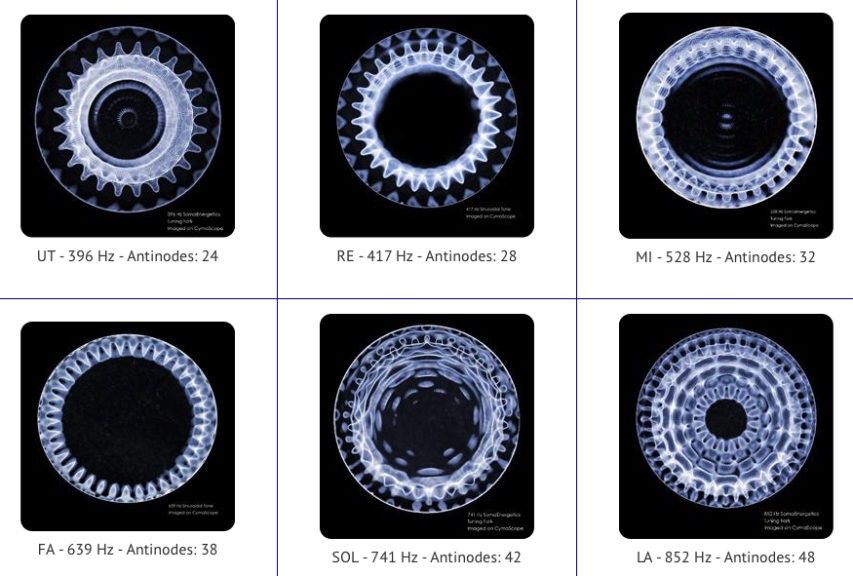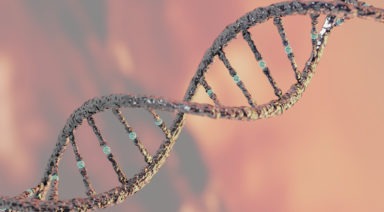Healing Frequencies of the Ancient Solfeggio Scale

Early in the 11th century, an Italian Benedictine monk, Guido of Arezzo, was looking for ways to teach melodies and harmonies to monastic choirs. One of his methods was a mnemonic tool, called the “Guidonian Hand.” Notes were associated with places on the fingers and palm. Once mastered, a choirmaster could point to his hand to inform singers of the next note. This was a new way to teach music — but Brother Guido continued to innovate.
Finding a way to express a musical scale, he created staff notations to teach chants and hymns. Guido’s original notations were “UT RE MI FA SOL LA,” derived from the first syllable of each half-line of the ancient “Hymn to Saint John the Baptist,” descended from an even more ancient work by Horace, an 8th century BC Roman poet.
This scale of six notes (C, D, E, F, G, A), the ancestor of our “so re mi fa so la ti do,“ evolved into the modern diatonic scale after “UT” became “DO” in the 19th century, and “TI” (B) was added later. “Solfeggio” is based on the word “solfège,” the name for this notation method of teaching pitch and sight singing.
Solfeggio Healing Frequencies
Gregorian chants have a measurable influence on human psychology and physiology. Those who perform the chants experience the lowest heart rates and blood pressure of the day while singing, according to Dr. Alan Watkins, a neuroscience lecturer at Imperial College, London. Other research suggests that singing the ancient compositions relieves fatigue and alleviates depression. Scientists have also observed that monastic singers require much less sleep; as little as two hours a day.
Solfeggio Geometry and Cymatics
Cymatics is the science of observing the effects of sound and frequency on matter usually in the form of liquid or powder. The term was coined by Swiss scientist Hans Jenny, who used specialized equipment that allowed a viewer to observe shapes formed in a medium under the influence of sound wave frequencies.
A cymascope study for SomaEnergetics, a company specializing in education and equipment for sound therapy, recorded cymatic images of each of the Solfeggio frequencies. Each frequency image contained “nodes” and “antinodes,” or the tops and bottoms of visible standing sound waves.
Counting the antinodes, the researchers discovered discovered that most of the Solfeggio frequencies, precisely produced by tuning forks, are “divisible by 3, 6, and/or 9. Any whole number divisor of 72 carries a mathematical relationship between phi and certain frequencies; 12, 9, 8, 6, 3, and 2 all work.” 12, 9, 6 and 3 all have special significance in many number-based esoteric systems. And coincidentally, the hz frequency numbers (396, 417, 528, 639, 741, 852) can all be reduced to one of these numbers (369 = 18 = 9, 417 = 12 = 3, 528 = 15 = 6, 639 = 18 = 9, 741 = 12 = 3, 852 = 15 = 6).
Nikola Tesla said, “If you only knew the magnificence of the 3, 6 and 9, then you would have the key to the universe.” The researchers added that distortions in the images were the product of ambient background noise, but the structure and geometry of each frequency is apparent in the images.
Benefits of the Solfeggio Frequencies
Dr. Joseph Puleo, a physician and herbalist, began exploring the Solfeggio in the 1990s. He developed a theory that each of the six frequencies carried precise characteristics, and that the tones could be used therapeutically.
In 1988, Biochemist Glen Rein, Phd, converted and recorded Solfeggio scale Gregorian chants to scalar audio waves. The results were played to test tubes containing DNA. By measuring UV light absorption, Rein could document the effect of the music on DNA. He also compared the chants with other forms of music, including rock. While rock music had little or no influence, the chants caused a marked increase of light absorption, up to nine percent, leading Rein to conclude that Solfeggio scale sound frequencies cause resonance in DNA, and may have healing properties.
Since then, others have explored the healing potential of the Solfeggio frequencies. According to an article in Anti-Aging Medical News (Winter 2006), pulsed frequencies had a positive impact on osteoporosis. In another study, snails exposed to a range of frequencies, including some in the Solfeggio range, became more focused and active compared to a control group. “It was evident that exposure enhanced the creative capacity of the brain in snails,” the author wrote.
A Japanese study published in 2018 examined the stress reducing effect of 528 hz (MI or E) on the endocrine system. The researchers concluded that 528 hz music has “an especially strong stress-reducing effect, even after only five minutes of exposure.”
Using the Frequencies
Youtube has countless Solfeggio meditations that integrate the frequencies with music — over a million pages were returned in a Google search on “Solfeggio meditation.” Some websites offer expensive, specialized equipment — others offer precisely calibrated tuning fork sets. Some health practitioners strike the forks, then place them on specific acupuncture points and meridians while others create “sound baths” with gongs and singing bowls tuned to specific frequencies.
Someone wishing to experience the Solfeggio frequencies can spend a little or a lot, but a Youtube search and a good pair of headphones may be the best entry point for exploring the Solfeggio frequencies.
Solfeggio Frequency Characteristics
396 Hz — Releases Fear
417 Hz — Eases and Initiates Change
528 Hz — Healing and DNA Repair
639 Hz — Heals Relationships
741 Hz — Finding Creative Expression and Solutions
852 Hz — Spiritual Homecoming
Types of Aura and Their Meaning According to Their Color

The human aura is an energetic field that surrounds the body and reflects the emotional, mental, and spiritual state of each person. Its colors and vibrations can change depending on internal energy and external influences, providing information about personal balance and well-being. In this article, we explore what the aura is, its spiritual meaning, and how its interpretation can help understand and improve personal energy.
Table of Contents
- What Is the Aura and What Is Its Spiritual Meaning?
- Types of Aura According to Their Color and Meaning
- Red Aura: Energy and Passion
- Orange Aura: Creativity and Optimism
- Yellow Aura: Intellect and Joy
- Green Aura: Healing and Balance
- Blue Aura: Calm and Communication
- Indigo Aura: Intuition and Spiritual Perception
- Violet Aura: Transformation and Spiritual Connection
- White Aura: Purity and Spiritual Elevation
- Gray or Black Aura: Energetic Blockages and Protection
- Methods to Visualize and Read the Human Aura
- Relationship Between the Aura and the Chakras
- How to Cleanse and Balance the Aura to Improve Personal Energy
What Is the Aura and What Is Its Spiritual Meaning?
The aura is a field of energy that envelops all living beings and acts as an extension of their inner state. It is composed of different energetic layers that reflect a person’s physical, emotional, and spiritual health. Its vibration and color can change depending on mood, thoughts, and the level of consciousness of each individual.
From a spiritual perspective, the aura is a manifestation of vital energy, and its balance is essential for well-being. When the energetic flow is harmonious, the aura remains bright and stable, indicating mental clarity and emotional strength. In contrast, energetic blockages or dense emotions can create alterations in its tone and structure, affecting one’s connection with oneself and the environment.
In the Quantum Effect series, available on Gaia, expert Randy Veitenheimer explores the energetic nature of human beings and their relationship with consciousness. Through this series, concepts such as the duality of reality, interaction with the energetic field, and the influence of the aura on physical and emotional well-being are analyzed.
Types of Aura According to Their Color and Meaning
The spiritual aura of a person can manifest in different colors, each with a specific meaning. These tones reflect aspects of personality, emotional state, and energy level. Below, we explore the main colors of the human aura and their interpretation.
-
Red Aura: Energy and Passion
A red aura indicates a strong, determined personality full of vitality. It represents drive, action, and connection with physical and emotional strength. It is also associated with leadership, determination, and the ability to overcome challenges with courage.
-
Orange Aura: Creativity and Optimism
The orange aura reflects a creative, enthusiastic mind with great adaptability. It is linked to artistic expression, motivation, and a joy for life. People with this aura tend to be sociable, spontaneous, and enjoy exploring new experiences.
-
Yellow Aura: Intellect and Joy
People with a yellow aura have an agile, curious, and optimistic mind. This color is associated with intelligence, mental clarity, and communication. It also reflects a positive attitude, a sense of humor, and a strong ability to inspire others.
-
Green Aura: Healing and Balance
The green aura is related to healing, harmony, and connection with nature. It indicates a compassionate spirit, great empathy, and a profound ability to generate well-being in those around them. It is the color of those who seek personal growth and inner peace.
-
Blue Aura: Calm and Communication
The blue aura reflects serenity, mental clarity, and a great capacity for communication. People with this aura tend to be peaceful, reflective, and skilled at expressing their thoughts sincerely. It also indicates a deep connection with the truth and a natural inclination toward harmony in relationships.
-
Indigo Aura: Intuition and Spiritual Perception
An indigo aura represents a special sensitivity to the subtle and the transcendental. It is associated with intuition, extrasensory perception, and a profound connection with inner wisdom. People with this vibration often have a great capacity to understand realities beyond the obvious and a strong sense of spiritual purpose.
-
Violet Aura: Transformation and Spiritual Connection
The violet aura symbolizes change, evolution, and connection with higher planes of consciousness. It represents those who seek personal transformation and spiritual development, often feeling drawn to mystical knowledge or service to others. It is also related to inspiration and creativity in its highest form.
-
White Aura: Purity and Spiritual Elevation
A white aura is an indication of a pure and highly vibrant energy. It reflects a deep level of inner peace, mental clarity, and a connection with the divine. People with this aura tend to be spiritually evolved, with a strong sense of compassion and a desire to contribute to collective well-being.
-
Gray or Black Aura: Energetic Blockages and Protection
The gray or black aura indicates the presence of energetic blockages or a state of deep introspection. It can reflect moments of inner transformation, protection against external influences, or the need to release repressed emotions. Those who have this tone in their energetic field may be in a healing process or seeking clarity to overcome challenges.

Methods to Visualize and Read the Human Aura
Perceiving a person’s aura requires developing energetic sensitivity and the capacity for observation. Some techniques include the use of intuition, the practice of peripheral vision, and experimenting with different sources of light. With training and focus, it is possible to identify the colors and patterns of the human aura, gaining information about a person’s emotional and spiritual state.
-
Exercises for Perceiving the Aura
A simple method to begin perceiving the aura consists of placing the hands on a white background and relaxing while observing their outline. With a soft gaze and deep breathing, slight flashes or color shadows around the fingers can be detected. Constant practice helps to strengthen this ability and better interpret energetic vibrations.
-
Use of Kirlian Photography
Kirlian photography is a technique that captures the energetic field of an object or living being through high-frequency electrical discharges. In the case of the human aura, it is used to record the energetic emissions from the hands or body, revealing patterns of light and color. Although it is not a definitive method for interpreting the aura, it is a useful tool for observing changes in personal energy.
-
Meditation Techniques and Energetic Focus
Meditation is an effective practice for strengthening the perception of the aura and connecting with the energetic flow. Through concentration and visualization, it is possible to train the mind to perceive the subtle nuances of the auric field. Techniques such as white light meditation or energy scanning with the hands can help develop greater sensitivity to both your own aura and that of others.
Relationship Between the Aura and the Chakras

The aura and the chakras are deeply connected, as both are part of the human energetic system. While the aura represents the electromagnetic field that surrounds the body, the chakras are energy centers that regulate its internal flow. Each chakra influences a layer of the aura, and its state affects the aura’s vibration and color.
When the chakras are balanced, the aura remains bright and stable, reflecting physical, emotional, and spiritual harmony. For example, an open and healthy heart chakra strengthens the green aura, related to healing, harmony, and the connection with nature. Similarly, an active throat chakra enhances a light blue aura, associated with serenity, mental clarity, and a great capacity of communication.
If the chakras are blocked or unbalanced, the aura can become dull or fragmented. Factors such as stress, negative thoughts, or a lack of connection with oneself can affect its stability. For this reason, keeping the chakras aligned through meditation, conscious breathing, and energy healing helps strengthen the auric field and improve overall well-being.
How to Cleanse and Balance the Aura to Improve Personal Energy
Cleansing the aura is essential to release dense energies and restore energetic balance. One effective technique is the bath of light, which involves visualizing a white or golden light enveloping the body and removing any negative vibration. Elements such as salt water, sacred herb smoke, or energy crystals can also be used to purify the auric field.
Another way to strengthen the aura is through connection with nature. Walking barefoot on the earth, breathing fresh air, and receiving the sun’s energy help restore the energetic flow and revitalize the body. These practices allow you to release accumulated tensions and absorb positive vibrations from the environment.
In addition, it is important to care for thoughts and emotions, as they directly influence the state of the aura. The practice of positive affirmations, gratitude, and conscious emotional management helps maintain a high-energy field. Maintaining a routine of aura cleansing and balancing allows you to enhance vitality, mental clarity, and connection with your spiritual purpose.





































